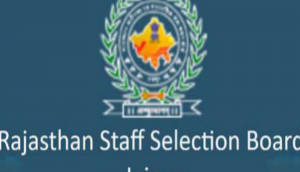
Exams are back in our schools. The no-detention policy of the previous government has been scrapped. The Department of Legal Affairs in the Law Ministry said, "Appropriate governments (states) may, if it deem necessary, make rules for detaining a child in class 6, 7 or 8 provided that an additional chance may be given" to students to reappear in exams.
The decision was taken keeping in mind 'the various adverse consequences" of the present provision. And what are these consequences?: "... Children are becoming indisciplined (sic) as they do not have fear of failing and thus affecting the quality of education." This is a curious argument, which spells out the irrational Asian and African obsession with fear and discipline in education.
Also read -How to survive litfests: A bluffer's guide
I was good at my books in school, but exams made me physically and emotionally ill. There was a price to pay for being a 'topper'. I had sleepless nights, broke out in cold sweats and developed acute diarrhoea around exam time. By the time I was at Oxford, and time came around for the Finals, I'd pretty much exhausted myself. I calculated that I'd been giving exams since standard one, making it 18 years of taking exams on the trot. I was suffering from exam fatigue. I enjoyed writing my last paper because I knew it was the last. No more exams after this. Hurrah.
The futility of Indian exams
There are exams and there are exams. In India, exams are about cramming facts. This is not a test of your intelligence; it's a test of memory. Having a good memory might make you a bright student in the eyes of the system but it's not education.
A biology teacher of mine in standard eight would dictate notes, class after class. It kept the boys quiet because everybody was busy noting down the dictation. Then, around exam time, she would make us underline important passages in the dictated notes, which we would regurgitate in the exams. If you were a good at mugging up, you would do well, even if you didn't understand a word of what you were putting down in the 'answer sheet'.
Exams in India are big business involving tutors and coaching centres. It's a self-perpetuating corrupt industry. Exams are about marking paragraphs in text books, guides and photocopied notes as 'Imp', 'Very Imp' and 'Very very imp.' If you took tuitions from the Maths teacher after school, he would pretty much give away the exam paper to you. Those who took tuitions from that particular teacher had an unfair advantage over the others.
The cram-based education system gives rise to its own pathologies. One instance of it is the rush to get "last ten years' papers" when exams draw closer. When you study the papers, a pattern emerges. I recall studying hard for my Accounts paper for two years for my school-leaving exams. Everyone did. When the invigilator placed the 'question paper' on our desks we were all stumped. The paper was 'out-of-pattern.' We complained to our external tutors. They said they were helpless: 'This has never happened in my entire coaching career,' said Mr Mitra, wringing his hands in despair.
Also read - Modi's cashless dream shattered: Indians pick toffee economy over Paytm
When exams become a kind of lottery, a guessing game as to what 'koschuns' will come this year, it's no longer about education. Setting and marking papers becomes a matter of sheer whimsy. Ladbrokes would be interested.
The failure's revenge
And what about the students who failed? They would be taunted with chants of 'failure, failure'. They were outcasts, bad boys whom we were told by teachers to keep our safe distance from.
But the outcasts had their revenge. The transition from standard five to standard six was a bit of a leap. Middle school suddenly became harder. There was physics and chemistry and Charles and Mary Lamb's Shakespeare in ant-sized print. When you entered standard six or seven you met boys who'd failed a couple of years. They were bigger, they were unruly and so they were made class monitors. The 'failure' was given legal powers to bully kids smaller than him. The gangster was now a policeman.
In the self-image he had of himself, the 'failure' was a good for nothing layabout. He took it upon himself to 'spoil' the 'good' students. He took on the role of chief sex educator, the tour guide to the human reproductive system. He was the one who got into fights outside school and hung out with older boys, smoking, riding bikes, smashing windows for a lark. He'd internalised that he was a loser and now he was going to make the best of it. Being detained for an extra year didn't seem to act like a goad to study harder at all. Never. You became a lout with a don't-give-a-damn air.
Producing sheep, not students
I have been a teacher myself. The most unruly class I taught in school was B4. There was a system where those with the lowest marks in a subject were put in one section. So you might be in B1 for Maths if you'd scored high marks in Maths, but if you had low scores in English, you'd be in B4 for English. Those kids are now my friends. They've become actors, directors, writers and lawyers. I hang out with them. When I ask them why they were so disinterested, they tell me that once they'd been clubbed together as the losers, they'd lose interest in trying to be better. The defeated will rebel.
As a former schoolmaster, I know continuous assessment is important in education. But this is not the same as exams that test only your ability to cram, not comprehend.
Kapil Sibal, as education minister, had taken a progressive view and made a change in India's notoriously retrograde education system that produces a sheep-like workforce but very little innovative thinking. Narayan Murthy has complained about this in several interviews. Now, it looks like we will continue manufacturing sheep, not creative thinkers, while parents will continue to shell out huge sums of money so that their wards can nail hundred on hundred and get their mug shots on rusty hoardings.
(The writer taught at The Doon School, and is the editor of Recess: The Penguin Book of Schooldays)
First published: 13 January 2017, 21:42 IST






![BJP's Kapil Mishra recreates Shankar Mahadevan’s ‘Breathless’ song to highlight Delhi pollution [WATCH] BJP's Kapil Mishra recreates Shankar Mahadevan’s ‘Breathless’ song to highlight Delhi pollution [WATCH]](https://images.catchnews.com/upload/2022/11/03/kapil-mishra_240884_300x172.png)

![Anupam Kher shares pictures of his toned body on 67th birthday [MUST SEE] Anupam Kher shares pictures of his toned body on 67th birthday [MUST SEE]](https://images.catchnews.com/upload/2022/03/07/Anupam_kher_231145_300x172.jpg)






